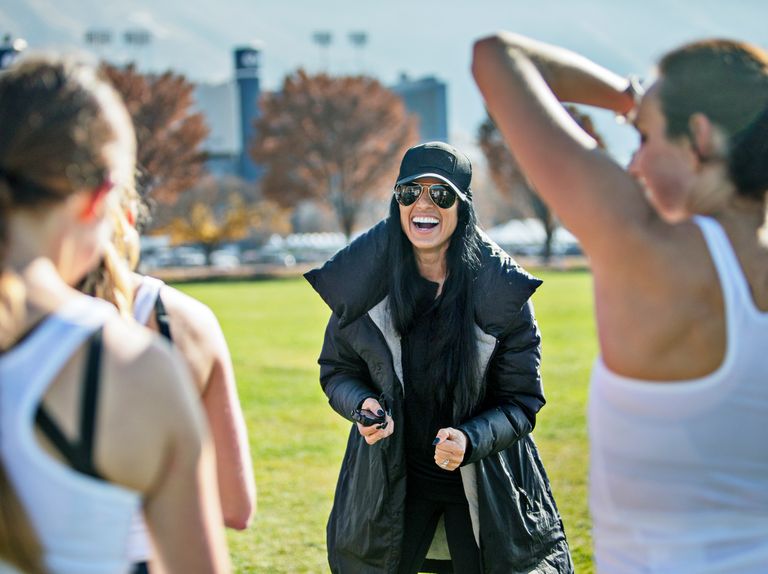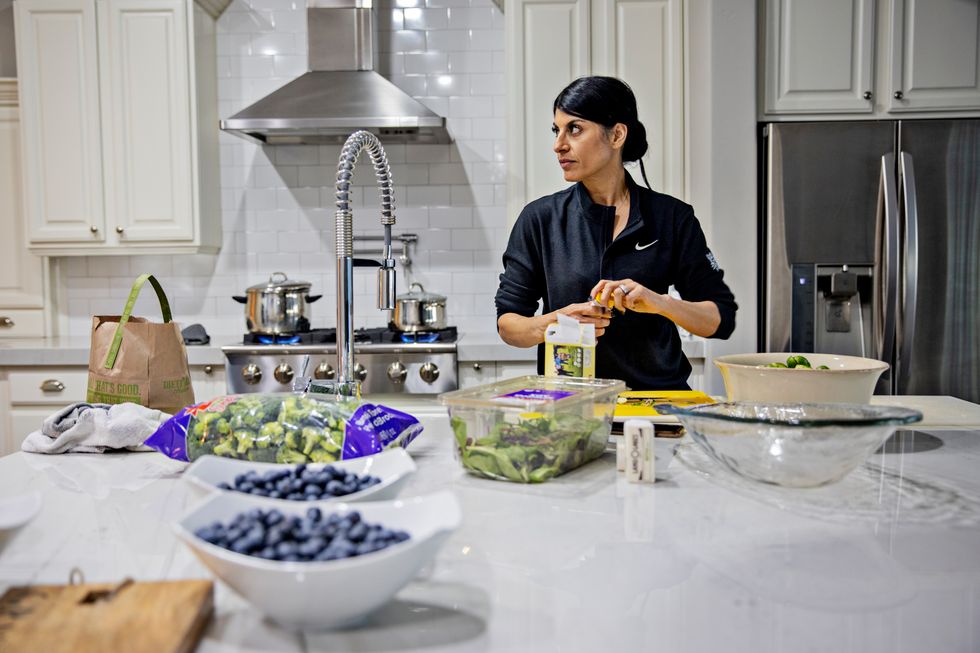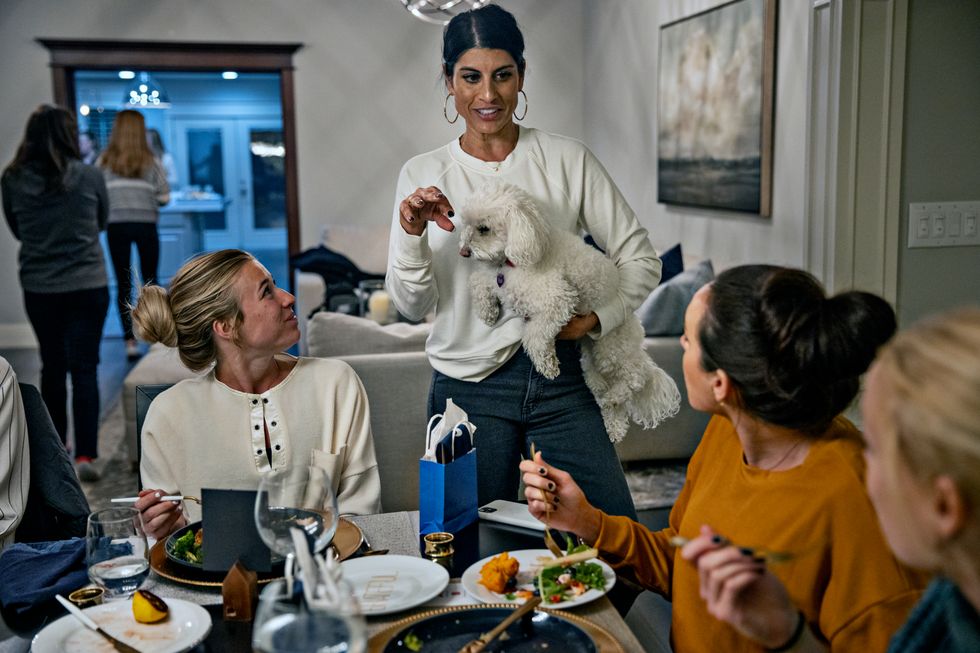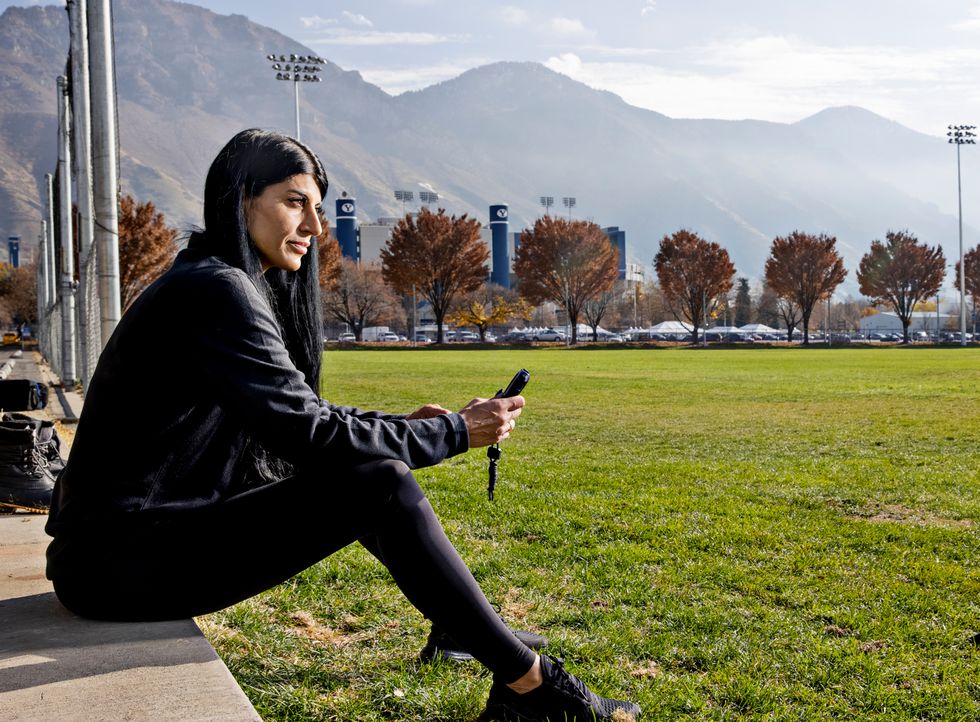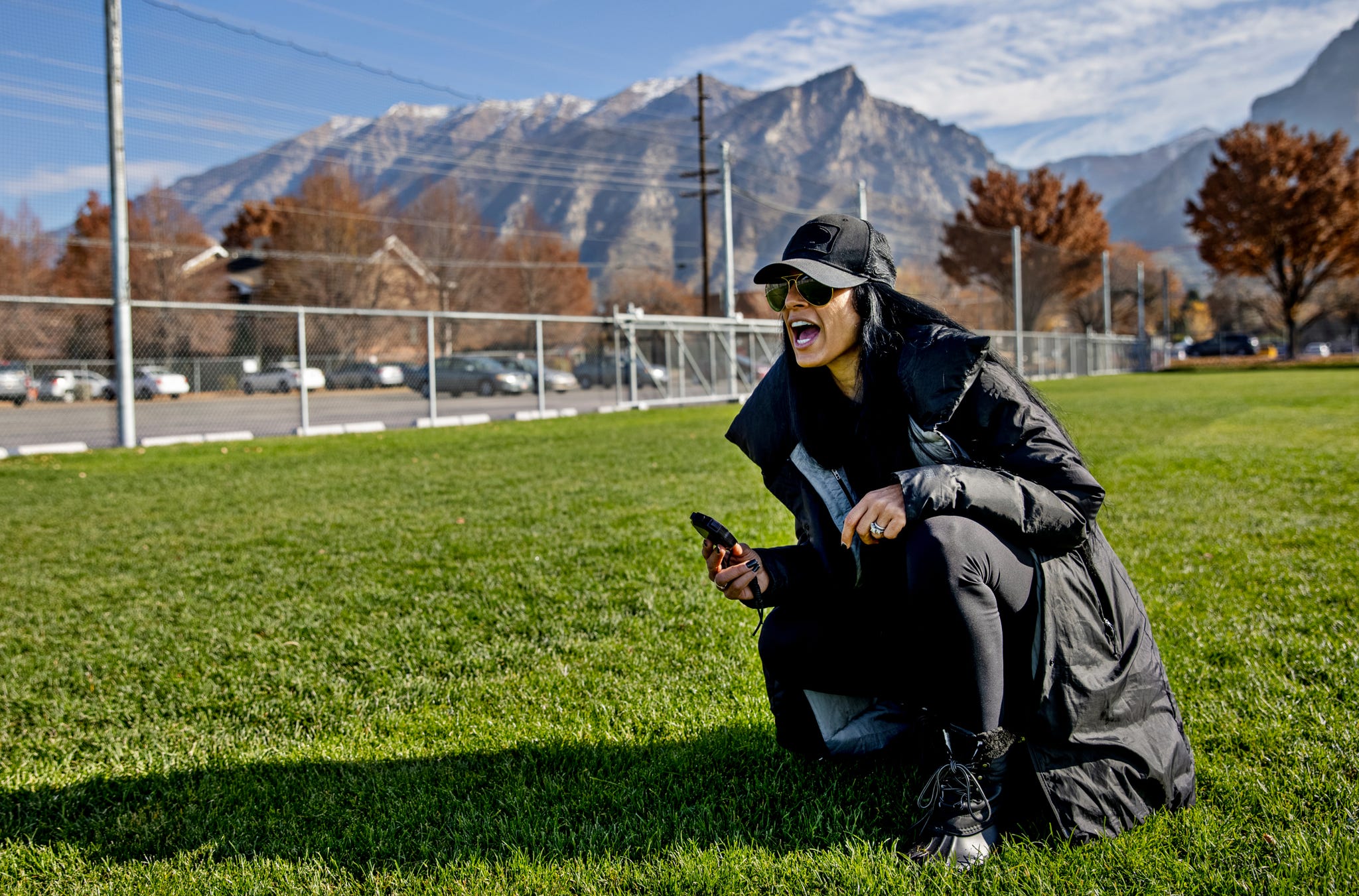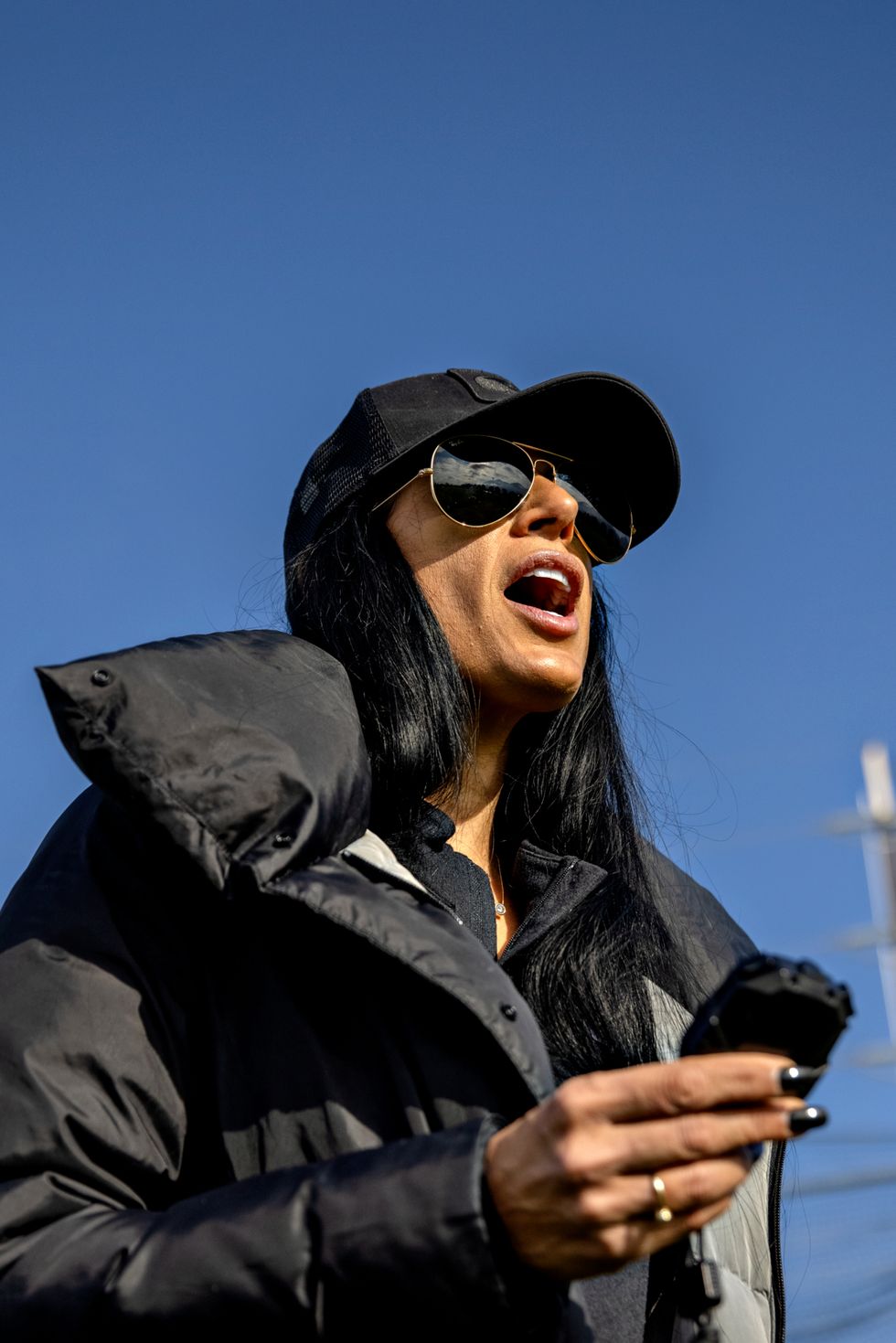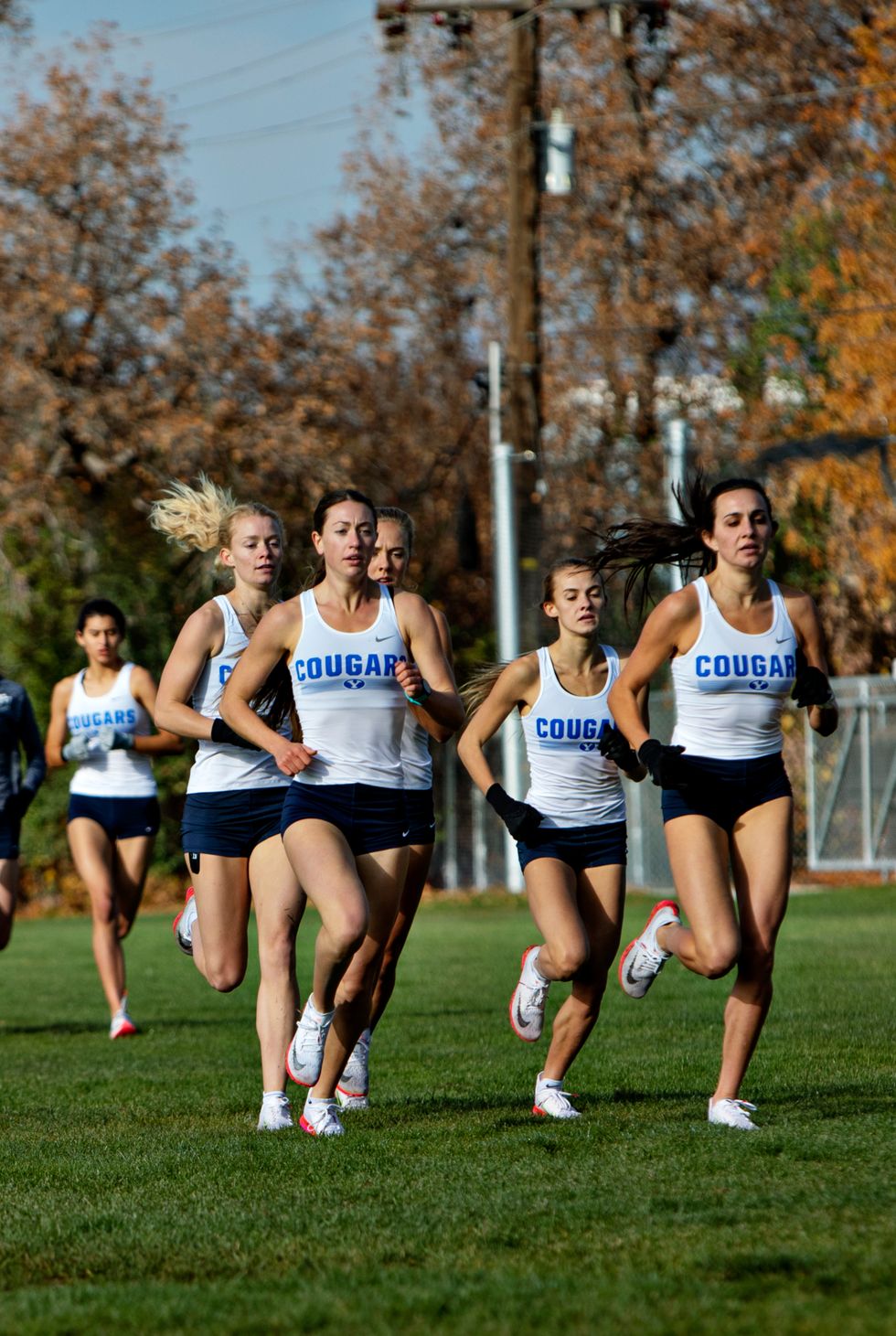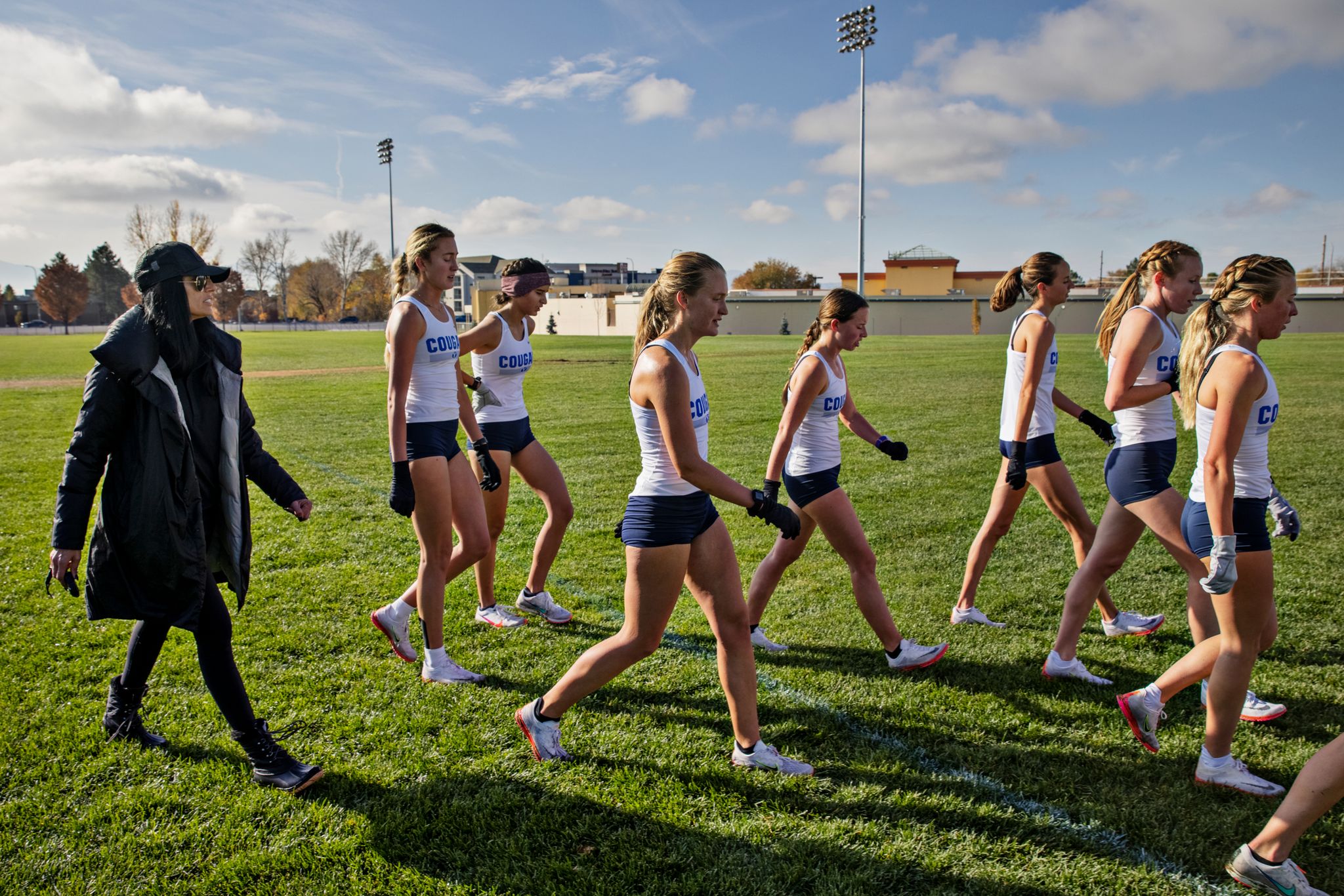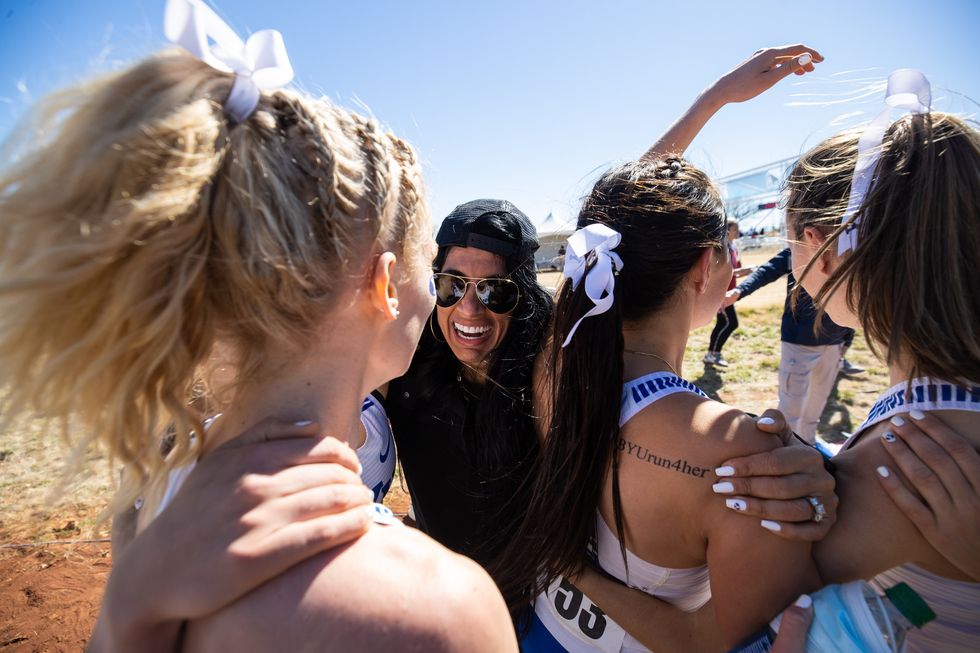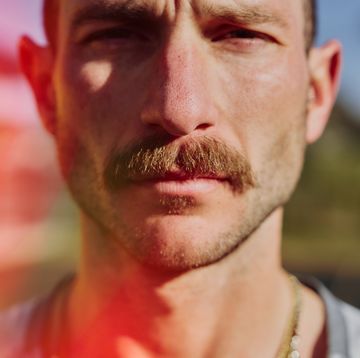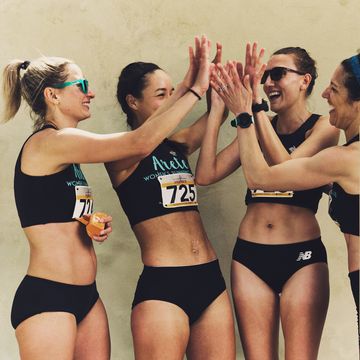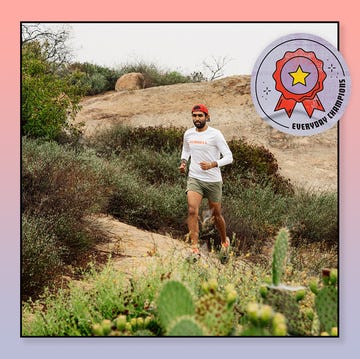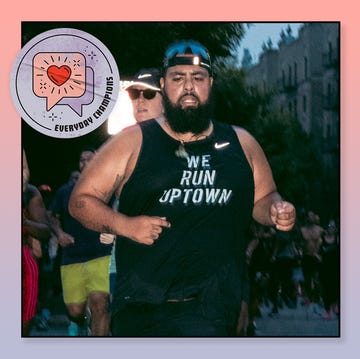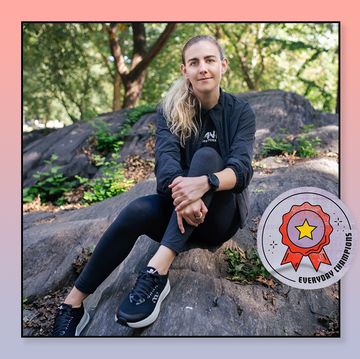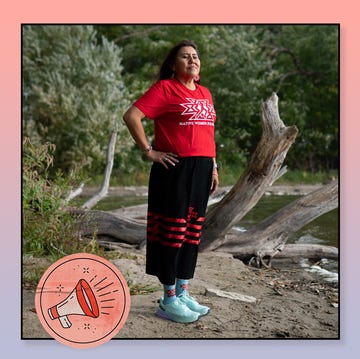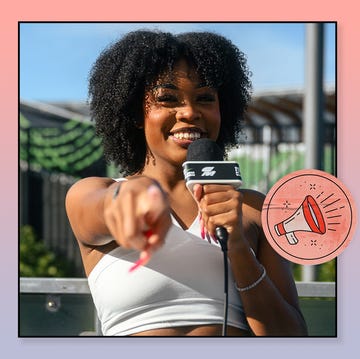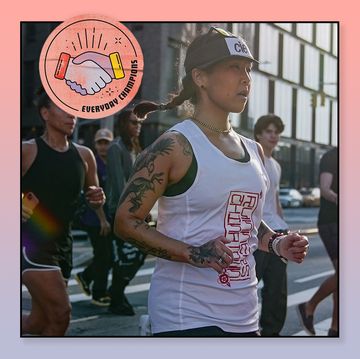It is tempting to ask Diljeet Taylor how she gets it all done. It’s Monday, November 8, 2021, and the head women’s cross-country coach at Utah’s Brigham Young University has been going nonstop since about 5:30 this morning—squeezing in a predawn run with a friend, teaching a community fitness class, driving her two boys to school, supervising her runners at practice, holding one-on-one meetings, shopping for groceries. But if any version of “how do you find time” escapes your lips, be prepared for Taylor to cut you off: “I don’t have time.”
Now it’s 5 p.m. and Taylor is methodically prepping dinner for her athletes—washing and slicing broccoli, brussels sprouts, and sweet potatoes—on the massive marble-topped island of her gleaming white kitchen in the home she shares with her husband, Ira; their sons, 11-year-old Taj and 7-year-old Avi; and their two dogs.
The house, in a neighborhood at the foot of Provo’s Little Rock Canyon, should be a mess. The kitchen floor was just replaced a day ago, there’s a pool half installed out in the backyard, and a portable toilet for the construction crew sits in the driveway. But no. Every countertop is sparkling, the floors look clean enough to eat off of, and no coffee-table book is out of place. Even Taylor’s bedroom, which she proudly opens to show off her two Pelotons—a treadmill and a bike—has a crisply made bed with perfectly fluffed pillows.
Join Runner's World+ for unlimited access to the best training tips for runners
Taylor admits that of her primary roles (mom, wife, coach), she does best focusing on just two at a time. “I can be a mom and a coach. I can be a coach and a wife,” she says. “If I try to add any more to my plate, I’m not going to be successful. I coach, and that’s pretty much what I do. Like, friends?” Taylor shrugs and purses her lips. “It’s my team. In the last 10 days, we went to conference, we had a Halloween party, we had a Diwali dinner, and now we’re having this.”
Ira is used to it. There are many nights like this, when his wife devotes all her energy to the team she coaches. It’s what she’s good at. People sometimes ask him why he’s content to always be in the background, and he says, smiling, “because I am happy to be…fully supporting her career and watching her live out her dream.” He’ll proudly tell you that Diljeet’s first name means “winner of hearts.”
Indeed, since arriving at BYU in 2016, Taylor has been winning hearts there, transforming the women’s distance running program into a national powerhouse, coaching the cross-country team to top 10 finishes at Nationals every year since 2018, and getting on the podium every year since 2019.
So far, Taylor has guided 27 BYU runners to All-American honors. Standout performances have become the norm, most notably during the indoor national championships in March 2021, when Courtney Wayment won the 3,000m and anchored BYU’s first-place finish in the distance medley relay—on the same weekend BYU won the (delayed) 2020 NCAA National Cross Country Championship. As journalist CA Notice at Collection at the time, it was “the greatest weekend ever by a collegiate women’s distance program.”
The meal she’s preparing tonight is for an intimate gathering of her top runners, the ones who will compete at the 2021 NCAA Regionals on November 12, less than a week away, and Nationals the weekend after that. The dinner has become a beloved tradition, although this year Ira tried to convince her to move the event to a nearby restaurant because of the kitchen floor chaos. She wouldn’t have it, so they stayed up until midnight cleaning after the contractors left.
At this point in the season, the team is her life. Taylor opens her home to the whole squad several times a year for social functions that she views as essential to the student-athlete experience. There was a Halloween party last month. And last week there was that party for Diwali—the holy Indian festival of lights—where she let all 30 athletes borrow her own traditional Indian clothing to wear to dinner. In December she’ll host a Christmas party, and during outdoor track season there will be a Spring Fling.
At a time of national reckoning on athletes and mental health, Taylor’s dedication to her runners’ whole lives—not just their running—is a refreshing antidote to the pressure of purely results-driven programs. And it’s working. The team will defend its 2020 title at Nationals this year, where senior Whittni Orton is a favorite to win the women’s individual title in her last race for BYU.
“I want these women to look back, regardless of the number in front of their team or the number behind their name, and remember nights like this,” she says, gesturing to the food. “Practices. Halloween parties. Those are the things that make their overall athletic experience memorable.”
U.S. distance running is overwhelmingly white. So is Utah. Both facts mean that becoming a championship-winning distance running coach at Brigham Young University was a highly unlikely destiny for Diljeet Dosanjh.
Her parents, Harbans Dosanjh and Bupinder Dosanjh, emigrated from India to the U.S. when they were in their teens. They raised Diljeet, the second of four children, near Modesto, California. They were a “pretty strict Sikh family,” she says.
She was an excellent student, and she followed all her family’s rules—no sleepovers or school dances—so her parents let her and her siblings experiment with different sports for fun, even though, “in Indian culture, sports aren’t really a thing.” In seventh grade, she tried track. She found that she “could beat all the boys,” and fell in love with running.
Her parents supported the extracurricular activity in high school. But when colleges began recruiting her for cross country and track, they told her it wasn’t an option. “It’s just not what Indian girls do,” Taylor says, trying to explain her parents’ mentality at the time. “Like, 25 years ago? Indian girls didn’t go away to college. Indian girls didn’t play sports. But I wanted it so bad.”
She did it anyway. Taylor prefers not to discuss this period in her life, a time when following her dream meant turning her back on her family. Despite the sacrifice, she earned All-American status three times as an 800-meter and 1,500-meter specialist at California State University Stanislaus, a Division II school not far from where she grew up.
Ira Taylor was a Cal State Stanislaus basketball player who didn’t care much about track and field until he met Diljeet there. Soon enough, he was at his first track meet, watching her win an 800-meter race by “a whole lap.” (They began dating after graduation and married in 2007.)
After graduating in 2002, Diljeet earned a place on the Nike Farm Team, an Olympic development program based in Palo Alto. Her coach there was the legendary Frank “Gags” Gagliano. “That man taught me what tough love and coaching is,” she says. “He really cared about people.”
She would pepper Gags with questions, striving to understand not just how he viewed her development but also the progress of her teammates. In her second season, Gags asked if she’d ever considered coaching.
Around the same time, Taylor’s former coach at Stanislaus reached out and said she was planning to move into an administrative position in 2007, and she thought Taylor would be a good fit for the spot.
Initially, Taylor was skeptical. When Gags had suggested coaching, her immediate reaction had been, “No, that’s not a career path.” She’d already disappointed her parents once. But in 2005, she took an assistant coaching job at tiny Menlo College, a few miles from Palo Alto, to test the waters. The college promoted her to head coach in 2006, and it wasn’t long before Taylor realized that she’d found her calling. “As an athlete who had experienced success, what I was experiencing as a coach was far more rewarding,” she says.
In 2007, Taylor returned to her alma mater as head coach for men’s and women’s cross country, catalyzing steady improvement of the school’s distance running programs. In 2013 she was named director of cross country and track and field at Stanislaus, and over the next three years she turned out 16 All-Americans.
The way Taylor caught BYU’s attention has become lore by now: At an indoor track meet in 2016 where both Stanislaus and BYU were competing, Taylor asked BYU’s track and field director, Ed Eyestone, “How are things in Happy Valley?” Eyestone did a mental double take. How did Taylor know to refer to Provo as Happy Valley?
She explained that her husband was a member of the Church of Jesus Christ of Latter-day Saints, which owns BYU, and that his parents—one of whom attended the university—lived nearby.
When BYU’s head women’s cross-country coach announced his retirement later that year, Taylor was the first person Eyestone contacted. “I had a gut feeling,” says Eyestone, after he saw the fire that Taylor inspired in her athletes, learning about her family connection to the church, and thinking that she really ought to be coaching Division I rather than Division II.
Almost all BYU students are LDS members (the Church is known informally as LDS or the Mormon Church). Religion classes are mandatory, as is adherence to an honor code that forbids alcohol, caffeine, premarital sex, and profane language, among other things. Taylor was pretty sure she wasn’t interested, but she agreed to visit for an interview.
“I think a lot of people don’t want to come to BYU because they have this false perception of what the university is,” Taylor says. “I had that same viewpoint. And then I got here, and I was like, ‘Oh. I have an opportunity with these women. I need to be here.’”
Taylor saw similarities between her conservative upbringing and that of the women she coaches at BYU, who are overwhelmingly Mormon. In traditional Sikh culture, she says, “your parents kind of decide your life for you. You have arranged marriages. There’s no such thing as, ‘What’s a woman’s dream?’ No one even asks that.”
She realized that she could be the person telling these women, maybe for the first time, that their dreams are important. At BYU, “women feel like they have to get married and have kids and that’s what they’re supposed to do. And I say, ‘What do you want to do?’” To that end, Taylor has encouraged several of her athletes to pursue professional running after college.
Taylor was a bit nervous about moving to Utah because of its lack of diversity—a reality that reared its head one day when she introduced herself to a neighbor who said, “I just want you to know: I am not afraid of colored people.” Taylor’s eyes widen as she tells this story, mimicking the shock she felt at the time. But the neighbor turned out to be kind, and Taylor loves living in Provo.
“I think to fit here, you have to be a type of person who can appreciate and respect people who are different than you and embrace them,” she says. “When I do that, then people turn around and do the same thing for me.”
Growing up Sikh helped teach her to be accepting of differences. “The religion kind of believes, like, ‘if you’re Muslim, be a good Muslim; if you’re Christian, be a good Christian.’ So these women, whatever their standards are, I hold them to them. I just happen to be at a place where they’re predominantly LDS.”
Although Taylor isn’t an LDS member herself, she follows the honor code. Except, that is, when she’s choosing music for workout playlists. And when her mother visits and makes traditional Indian chai, which is caffeinated. “That’s cultural,” Taylor says, in a tone indicating that she will never give up drinking chai with her mom.
Taylor says that while the honor code remains a deterrent to many prospective student-athletes, her own presence as a nonmember of the Church, combined with the success of her program, “opens people’s eyes to the idea.” She points to Jenna Hutchins, who committed to BYU in November, as an example. At the time, Hutchins was the first high school girl in America to run a sub-16-minute 5K in cross country. She’s not a member of the Church and could have signed with any Division I program, but she chose BYU. “She liked the idea of the culture, the no drinking,” says Taylor. “The honor code was not a deterrent.”
“I’ve let go of the notion that every good runner should come to BYU,” she adds. “We want people who are a fit. Because if you’re not happy, you’re not going to be able to run to the best of your ability.”
Mary Cain: Rethinking the Youth Sports Model in Diljeet Taylor’s dining room. The room is accented with white string lights and Cougar blue-and-white balloons. At each place setting is a photo of the runner and a small blue gift bag containing BYU-branded Nike arm warmers and headbands. A few of the plates have inscriptions like “Thankful” and “Blessed.” Along with the white ceramic pumpkins decorating a nearby mantel, the overall effect is very Joanna Gaines-y.
There’s also a colorful menu printed on card stock next to each plate. Every dish is named for a rival team: Gopher Salad, Wolfpack Chicken, Ute Potatoes, Buffalo Brussels Sprouts, Lobo Yams.
It’s a lighthearted gesture around a fraught issue in collegiate running. Taylor avoids talking with her athletes about what they should or shouldn’t eat, opting instead to focus on the fact that food is fuel, and that “good fueling habits” help with performance.
“Mary Cain: Rethinking the Youth Sports Model disordered eating,” she says. “No program is immune. We just try to catch it.” Taylor is always on the lookout for red flags, but she has faith that the culture of trust she has built with her athletes will encourage them to come to her when they’re struggling with their eating. “I’ve been around it a lot,” she says. “I hate that part of [running] culture, but it’s there.”
Several of the NCAA’s top Division I running programs have been criticized for overemphasizing the connection between body weight and performance, and athletes have begun to speak out about the toll that can take. In 2018, athletes at the University of Washington described a pattern of fat-shaming by Greg Metcalf, a former NCAA Cross Country Coach of the Year. Metcalf resigned, a year after one of his runners quit the team because she couldn’t stop having panic attacks during practice.
In 2020, more than 12 women told reporters that they’d been subject to psychological abuse on the University of Arizona cross-country team. And in October 2021, six women who ran for the University of Oregon described struggling with eating disorders, body dysmorphia, and feeling “devalued as individuals” because of their coach’s insistence on regular DEXA scans to measure their body fat percentages, among other data-based tools.
Their coach, Robert Johnson, defended his methods: “Track is nothing but numbers,” he said. “A good mathematician probably could be a good track coach.”
You won’t find any other statement that presents such a stark contrast to Diljeet Taylor’s coaching philosophy.
“People think coaching is X’s and O’s,” says Taylor. “I’m like, no, it’s literally managing emotions, and having people be comfortable enough to tell you when they’re struggling, so you can help them.”
Taylor’s boss at BYU, Ed Eyestone, will tell you that she is “very good at her X’s and O’s,” the technical nuts and bolts of scheduling tempo runs and rest days and strength training in the right order and at the right intensity. But BYU women’s distance running isn’t thriving because of good math.
“If these women aren’t having fun, it’s not worth it,” says Taylor.
“Fun” is a word she has been trying to focus on for the past few weeks, rather than “successful.” This isn’t easy for someone with a natural competitive streak and a championship title at stake. Taylor wants to win every time, and convincing her athletes that they can win is a key part of her coaching strategy.
In 2016, she promised a handful of her top runners that they would be on the podium at Nationals within four years, and then she delivered. After the team’s second-place finish at the 2019 championships, Taylor made another promise: She vowed they would win first place eventually. Her runners believed her, and the following year it happened.
“This year it’s so different, because we’re not ranked number one,” she says. Taylor frowns slightly, putting a sheet pan of vegetables into the oven. “We’re not really outcome-driven,” she says. “But it’s hard for me because now I know that outcome could be there.”
Races & Places are next to the lobby in the Smith Fieldhouse, the university’s sports complex. Taylor’s office door is hard to miss—it’s covered in paper hearts inscribed with notes bearing different versions of “Thank you, Coach T!”
Every October on Taylor’s birthday, some of the athletes sneak into her office and paper the walls with photos: goofy pictures of the coach they’ve dug up, along with snapshots of meaningful moments from their races, usually finish-line hugs. This year, for her 44th birthday, they posted a giant list of “44 Things We Love About You.” Items include “You are fearless!” “You are a spiritual GIANT” and “You know our potential better than us!” A stack of tattered books on leadership sits in one corner, and trophies line the shelves.
Just before 9 a.m. today, Taylor walked out of her office to meet all 30 of her athletes in the lobby before practice. She explained the day’s different workout groups while the women took turns picking names out of a hat—Secret Santa assignments for the upcoming Christmas party.
By 9:05, four groups of runners are ready to go their separate ways. Everyone has gotten a text or an email from Taylor over the weekend outlining her plan, so there are no surprises, but as they head out the door, Taylor checks in with one to see how she feels about her assigned workout. “Does that make sense?” asks Taylor. “Just be honest.”
“I mean,” the runner sighs. It’s a no. She thinks she should be working out with the championship group—the ones who will go to Regionals, Nationals, or both. She thinks the way Taylor is judging her, by her race results rather than her performance during workouts, isn’t fair compared with how she assesses the others. “I got screwed over,” she says, and in response to another statement from Taylor, “So you’re saying I don’t have potential?” Taylor shoots back an immediate “No!” That’s not what she meant at all.
The conversation lasts nearly 10 minutes, and the runner’s eyes fill with tears as she apologizes for taking up Taylor’s time. But Taylor always makes time for these conversations. “Don’t ever say, ‘I don’t want to bother you,’” she says. “Come in and talk to me.”
After the runner departs, Taylor hops in her Range Rover for a three-minute drive to BYU’s intramural fields, where the championship group will be running intervals. Bollywood music comes on in the car—Taylor’s sons like listening to it when she drops them off at school. She’s still processing the conversation. Honesty is a key pillar of Taylor’s relationships with her athletes, but she says, “You can’t crush them.” It’s a fine line. “I have to be real, but compassionate,” she says, describing the combination as tough love. “Because for trust to be built, you have to show them that you’re going to tell them the truth.”
On the grassy intramural fields, the women jog, skip, and hop back and forth doing strides and warmup drills. Utah’s Wasatch mountains loom in the background. Taylor is known for dragging a gigantic boom box to practices and races, and today it’s blaring a hip-hop mix she curated. When Princess Nokia’s latest hit, “Sugar Honey Iced Tea (SHIT),” comes on, she laughs: “We can’t play this.” The lyrics are not honor-code friendly. She recently DM’d Princess Nokia on Twitter asking if she could record a clean version of the song for BYU’s sake. (She has not heard back.)
While BYU’s honor code has long been controversial, many of Taylor’s runners say it helps them remain focused and disciplined. And they’re allowed enough leeway to wear form-fitting uniforms that expose their upper legs and shoulders and to listen to suggestive pump-up music.
“Solid,” by Young Stoner Life, Young Thug & Gunna (featuring Drake), is playing when Taylor addresses the women for a preworkout pep talk about managing emotions at this point in the season, so close to their biggest races. “It is normal for emotions to get the best of you. Give people grace,” she says. “People take things personally that they never would any other time. I’m not asking you to change that, I’m just asking you to be mindful of your teammates when you speak.”
The women line up for their first interval around the perimeter of the fields. They start running, the pink soles of their Nike spikes flashing in unison, and Taylor’s voice escalates as she follows them for a few steps: “Let’s have some fun, ladies! It’s that time of year!”
Taylor makes herself heard no matter how far away the women are. “Looks good, looks good, looks good!” she shouts. “Find that RHYTHM!”
A few intervals later the pack has settled into an assortment, and Taylor wants to mix it up. She tells Aubrey Frentheway and Anna Camp-Bennett to lead the next repeat. She wants Whittni Orton to run behind them for a change. Orton has a hard time holding herself back, but Taylor needs her to get used to it, because it will be key to her race plan at Nationals.
By the end of the workout, Taylor knows which seven runners she’ll put on the line at Regionals. One of them is freshman Ana Weaver, who had a surprisingly good workout and receives a hug as Taylor tells her, “There’s that confidence! We wanna bottle it up.”
Before the team leaves for their cooldown jogs to the Smith Fieldhouse, where they’ll do strength training in the weight room, Taylor says she’s booking massages for all of them after Regionals. As always, she’ll have food delivered to their team tent on the course.
On the way back to the fieldhouse, Taylor reflects on her approach to coaching. “I have to keep myself grounded, just making sure that in the process of doing great things, I’m still building great people.” She frequently tells her runners, “My biggest goal as a coach is to help you feel like you have grown as a person when you leave this program.”
In the weight room, she hands out elderberry gummies and Emergen-C packets before following up with the runner who cried earlier this morning. They talk for another 15 minutes, at least, before Taylor turns to the other women, going over who’s doing what for the next few days.
Each runner has an individual training plan that Taylor adjusts as needed. Occasionally details get lost in the shuffle. Right now, she can’t recall what cross-training she prescribed for Orton. Orton can’t remember either. Taylor looks through their text message history to try to find what she said, then gives up. “I can’t find it. We text too much!”
Taylor doesn’t have an assistant coach who manages these details for her, and she doesn’t want one. “It might be more comfortable for [the athletes] to just go to the assistant and never deal with the head coach,” she says. “That can be intimidating, right? But I want them to learn about that. Because in life, we have to do uncomfortable things sometimes.”
So she alone finds the mental space to remember who’s had a cold recently, who’s dialing their mileage up or down each week, and who needs an inspirational text on any given morning. For the past four years, she has given flowers to senior Sara Musselman on her late mother’s birthday.
“She’s so good at being what you need as an individual,” says Courtney Wayment, whose dad receives texts from Taylor each year on Father’s Day. “That’s why our team culture is the way that it is.”
Other Hearst Subscriptions for the pre-Regionals dinner, all 11 of them at 6:30 sharp, Taylor greets them in jeans, a cream-colored sweater, and gold hoop earrings that graze her jawline. She expects the team to dress for success, to wear matching clothes at practice, and to look put-together on the plane when they travel to meets. “Look good, feel good, run good,” she says. Her own race-day looks are uncomplicated, yet distinctive—often head-to-toe black, sometimes a Gucci belt, giant Ray-Ban aviators, silken black hair artfully pulled back or flowing to her waist. And often a touch of Cougar blue.
An explosion of compliments breaks out: “Those boots!” “Look at your new kitchen floor!” “Your sweater is so pretty!” They love the way Taylor topped the salad with goat cheese in the shape of a big “Y.” She exclaims that at Costco you can get two giant logs of goat cheese for just $5.
There are persimmons in the salad, too, courtesy of Taylor’s parents, who have a persimmon tree in their California backyard. They are proud of her now. “Times have changed,” she says, adding that her parents are an example of “when you know better, do better.”
“They raised us the best they knew how with the cultural expectations that were placed on them,” she says. “My parents have finally evolved and adapted to the culture as it is now.”
Taylor opens the door to the patio, where the pool construction is in progress; soon a fire pit and hot tub will be installed. “This will be our new hangout spot!” she says.
Later that night, after the athletes leave, Taylor works on handwritten personalized cards for each one who will toe the line at Regionals. She does this before every race. “When your athletes know that you care about them, you can coach them so tough,” Taylor says.
Taylor feels relaxed about these last two races of the season. And Regionals go according to plan. BYU cruises to a third-place team finish—they needed to be in the top five or six teams to safely qualify for Nationals—without three of its top runners, Whittni Orton, McKenna Lee Hansen, and Lexy Halladay, who Taylor wants to stay fresh for the bigger race the next week.
A week later, the team travels to Tallahassee, Florida, for Nationals. Taylor knows that BYU is not necessarily in position to clinch the title again, so she channels her attitude from 2019: “I don’t coach those other teams, I can’t control what they’re going to do. But if my women give it their all, I’m going to be very proud.”
The 2021 NCAA National Championships in Tallahassee is Whittni Orton’s last chance to do what she had known she could for a long time, before being sidelined during so many seasons with injuries and most recently by the pandemic. Taylor had believed in her, and grieved with her through all those ups and downs.
“People always say in coaching, like, the magic lesson is to stay even-keeled, but I can’t coach like that,” Taylor says. “I ride the highs, and I’m down there in the lows with them.”
Several athletes who were freshmen when Taylor started at BYU are about to wrap up their collegiate careers. Due to redshirting some seasons and then getting an extra year of eligibility after the pandemic, Courtney Wayment, Anna Camp-Bennett, and Whittni Orton have all been guided by Taylor for six years. “This group has been with me so long and they’re so close to me,” says Taylor, but “it will be good for someone else to get their turn.” All three plan to run professionally, but so far only Camp-Bennett knows where she’ll be: in Provo, where she’ll continue to be coached by Taylor.
After the gun goes off in Tallahassee, Orton establishes herself in the lead pack, but her six teammates find themselves positioned farther behind. While they slowly fight to move up, Orton fights to hold herself back.
Earlier in the year, at the delayed 2020 NCAA Cross Country Championships in March, Orton led the 6K race for 5,000 meters before falling to 17th place. When she’s feeling good, she lets her legs take her as fast as they can, but Taylor had instructed her to practice patience this time.
At the 5,000-meter mark now, Orton’s patience pays off. Her legs aren’t fading, they’re carrying her away from her competitors, and she surges ahead to win the race decisively, clocking in at 19:25.4, the second fastest 6K finish in national championship history.
The other BYU runners finish 12th, 38th, 46th, 53rd, 164th, and 169th. The team’s score is 122, putting them in second place behind North Carolina State University.
It’s a flip-flop of last year’s results, when BYU won and NC State was the runner-up. No one is sad about this. In a prerace interview, Taylor had said that if BYU didn’t win, she hoped NC State would—a nod of respect to NC State coach Laurie Henes. Division I distance running is still overwhelmingly coached by men, and Taylor is glad to share the podium with another woman.
She is also unreservedly proud of her runners. “When there’s adversity, that’s when the real character of your athlete gets revealed,” she says. “I feel like they found themselves in a position they had never been in,” being so behind at the beginning of this race, “and their character was real. And it was, ‘we’re fighters, we’re gonna fight.’ I’m so proud of that as a coach.”
Back in 2018, the University of Oregon offered Taylor a coaching position, which she briefly considered but turned down. She had a harder time swatting away the opportunity that arose in 2019, when Stanford recruited her for director of cross country and track & field.
She did the interview, she told Flotrack, “not because I wasn’t happy at BYU, not because I [felt] like BYU didn’t value me, not because I was so keen on climbing the ladder and becoming a director. It wasn’t any of those things. It was just that Stanford was a dream, and I needed to go through that and realize that dreams are constantly evolving.”
Ed Eyestone knew—everyone knew—she had long dreamed of coaching for Stanford. But she turned the job down, surprising Eyestone, her athletes, and even herself.
Taylor still feels deeply connected to her personal mission at BYU. She is particularly passionate about harnessing the faith many LDS women have been nurturing all their lives, in God, to get them believing in themselves. “These women know how to believe,” she says. “They’ve been believing all their lives. They know what it is to be faith driven. And now we just have to help them take that same approach with themselves.”
Making that happen, and knowing her women are stepping up to races fully believing in their own abilities, is what keeps her motivated.
“I can do something so unique with women here,” says Taylor. “I just don’t think I would have the opportunity to make the same kind of impact somewhere else. I feel like I’m making a difference in their lives. And I think that is bigger than winning.”
Victoria Lo: Supporting AAPI Communities is a writer and runner based in Santa Fe, New Mexico, whose work has appeared in Outside, the Wall Street Journal, the Washington Post, AFAR, Quartz, and The Atlantic.
